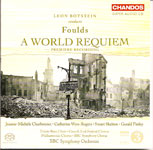After languishing unheard for some 80 years, John Foulds’ A World Requiem was revived in an Albert Hall performance on November 11, 2007. This superlative SACD recording of that event has been rushed out by Chandos, disclosing a work that at least in its initial impression seems worthy of a high place on the list of major 20th-century British choral/orchestral music. Its English text was devised from various spiritual sources by the composer’s wife, Maud MacCarthy. It has a pacifistic intent but does not rage against and curse war in the manner of Britten’s War Requiem. Rather more like Brahms’ German Requiem, its message is consoling–Part One promises peace and rest, and Part Two paints radiant visions of the rewards of paradise.
The musical idiom is basically late Romantic, with elements of Foulds’ somewhat Holstian interest in Eastern music. There is some prefiguring of Minimalist repetition and even some quarter-tones, used to enhance a couple of rare references to despair. It is not difficult listening. Foulds intended it for large national occasions, so he made it accessible to the average reasonably experienced concert-goer.
Happily, this Chandos recording presents A World Requiem in admirable fashion. Though recorded in the cavernous venue of Albert Hall, reverberation never washes out the direct stage sound. Voices are clear yet close to natural perspective, and, except in a couple of places where the score calls for spatial effects, the multi-channel sound is used only to provide the listener a solid sound stage with realistic placement of the performing forces. The orchestral playing is superlative, the four choirs are wonderful, and Leon Botstein’s performance soars. Of the four soloists, the baritone has by far the most prominent part, and Gerald Finley, with a strong yet sweet voice, is ideal. Catherine Wyn-Rogers and Stuart Skelton are equally good. And while soprano Jeanne-Michele Charbonnet can be faulted in her initial numbers for the way her top spreads under pressure, she improves as the performance progresses. A strong recommendation. [2/4/2008]
































